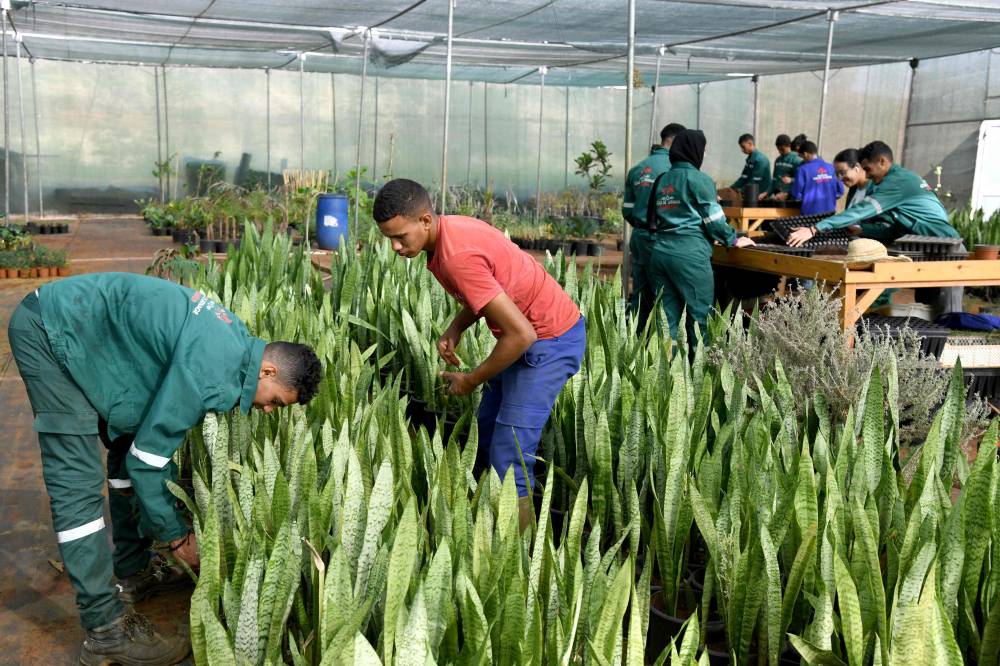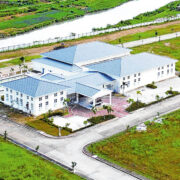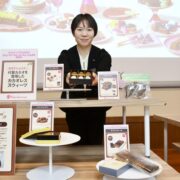Morocco gardening school cultivates hope for marginalized youth








SALE, Morocco—After Hind Bensbitia dropped out of school as a teenager, she was stuck at home with few prospects for her future—until she stumbled across Morocco’s first gardening school.
Now at 20, she has already seen a change in her outlook both on her own future as well as the planet’s, after joining the school in the northwestern Moroccan city of Sale.
The school provides free training mainly to dropouts and other marginalized youths threatened with unemployment.
“After leaving school, I spent two years at home,” said Bensbitia. “I wasn’t satisfied. I wanted to be active.”
Three years ago, she came across the gardening school, Bouregreg Med-O-Med, by sheer coincidence.
Launched by the Spain-based Islamic Culture Foundation (Funci) in 2018, the school is the first of its kind in Morocco.
“Before, I never imagined making gardening my job,” said Bensbitia. “This training brought me a lot. I’m seeing the environment and the need to protect it in a different way.”
Bensbitia says she feels “more in my element than anywhere else” at the school.
Bouregreg Med-O-Med aims to raise awareness about climate change while promoting the social inclusion of marginalized young people, particularly those affected by unemployment, as well as championing gender equality.
In October, it received the European Training Foundation’s “Green Skills” award.
Unemployment and drought
Based in an eight-hectare field near an old landfill, the school promotes eco-responsible methods.
“The gardening model is entirely ecological,” Ines Elexpuru, communications director at Funci, told Agence France-Presse (AFP). “The building is bioclimatic, built with raw earth and the electricity is solar.”The school has a nursery of local plants that are better adapted to water stress, which is crucial for Morocco as the country suffers its worst drought in almost 40 years.
The drought will get even worse, according to official forecasts, as rainfall is expected to drop by 11 percent while temperatures are projected to rise by 1.3 degrees Celsius (about 2.3 degrees Fahrenheit) on average by 2050.
“Through this training, I realized that the life of a plant depends on our will to take care of it,” said Mohssine Errahimi, an 18-year-old trainee. “Simple actions can make a difference.”
Errahimi has been working as an apprentice gardener in hotels and for private employers since the age of 16. He joined the school with the encouragement of a former employer.
“After my training, I hope to start my own gardening business to help build my country,” he said.
The professional integration of young Moroccans is key for the school, as they are often the hardest hit by economic difficulties.
Unemployment rates for those aged 15 to 24 reached 38.2 percent in the third quarter of 2023, compared to an overall unemployment rate of 13.5 percent, according to the kingdom’s High Planning Commission.
In 2022, the commission found that more than one in four in the 15 to 24 age category were “not working, not in school or in any training.”
‘Complicated family situations’
Every year, the school takes in up to 90 apprentices, “young people who come from complicated family situations … and from really precarious and difficult surrounding neighborhoods,” said Elexpuru.
They are “motivated, want to have a dignified life and earn money to support themselves and their families,” she said.
She added that the three-year apprenticeship also contributes to “curbing irregular migration” as 70 percent of apprentices find a formal job once they graduate.
Between 20 and 25 percent of the trainees are young women, who are disproportionately affected by unemployment, at a rate of 19.8 percent compared to 11.7 percent for men.
Gardening “is always associated with men,” said Elexpuru. “At the beginning, it was complicated, with clients who were looking to recruit only men, but things are starting to change.”
Bensbitia said people sometimes showed her contempt for choosing this trade.
“For them, it’s not fit for girls,” she said. “But I don’t care … I have the support of my family and I will carry on.”
Loubna Nassif, another apprentice, age 17, also said there were “a lot of stereotypes around jobs that women are not supposed to do.”
“I say we should prove them wrong.”
AFP is one of the world's three major news agencies, and the only European one. Its mission is to provide rapid, comprehensive, impartial and verified coverage of the news and issues that shape our daily lives.
















